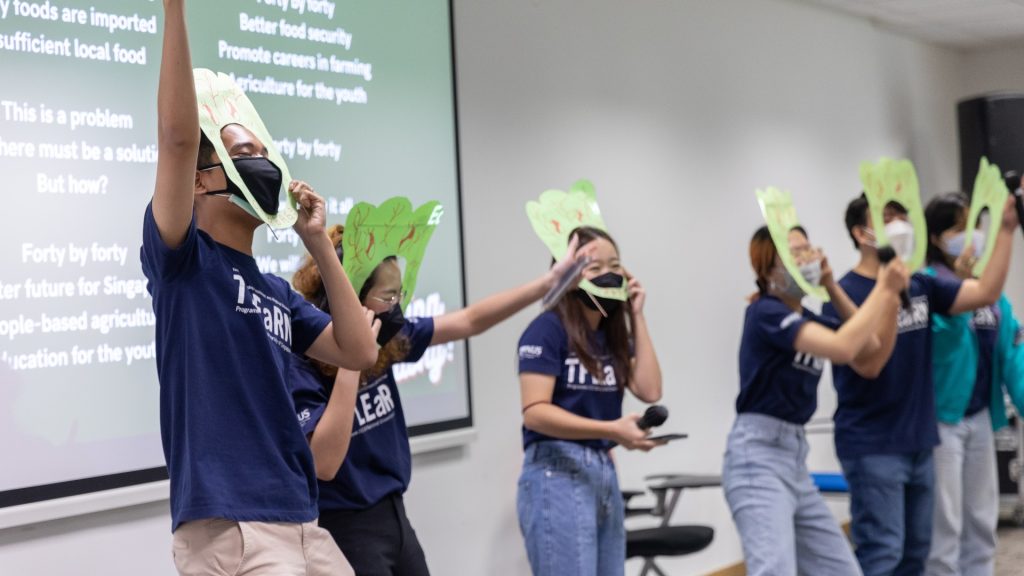Leadership Learning Beyond Boundaries
August 1, 2022
IN BRIEF | 10 min read
- The Temasek Foundation – National University of Singapore Leadership Enrichment and Regional Networking (TF-NUS LEaRN) programme is the first LEaRN programme to be held in-person since 2019 in line with the resumption of physical activities following the COVID-19 pandemic.

Students from across Southeast Asia had the chance to immerse themselves in cultural exchange, deepen their knowledge of sustainability and develop leadership skills at the recently concluded Temasek Foundation – National University of Singapore Leadership Enrichment and Regional Networking (TF-NUS LEaRN) programme.
The multi-phase regional programme, which ended on 22 July, is the first LEaRN programme to be held in-person since 2019 in line with the resumption of physical activities following the COVID-19 pandemic.
Sponsored by Temasek Foundation, TF-NUS LEaRN is NUS Global Relations Office's signature regional youth leadership development programme, providing students with opportunities for cultural exchange and networking. LEaRN aims to connect promising students and nurture the next generation of Asian leaders as well as foster their awareness of the key international challenges and regional opportunities. Through the programme, participants cultivate an understanding of sustainability within Southeast Asia, while being simultaneously immersed in the region’s vibrant entrepreneurship, technology, and innovation scene. Participants at this year’s programme comprised of 152 students, hailing from 20 local and Southeast Asian universities.

During the first of three phases, 27 NUS and 3 Singapore University of Technology and Design (SUTD) participants spent two weeks from 30 May to 15 June at Thailand’s Mahidol University in Bangkok, learning about sustainability practices through lectures, presentations and field trips. They were also exposed to the rich diversity of Thai culture through hands-on Muay Thai, cooking and dance workshops.
The programme resumed in Singapore from 5 to 22 July with the second and third phases, during which the students were joined by other undergraduates from 15 universities across the 10 ASEAN member countries, as well as from the Nanyang Technological University (NTU), Singapore Management University (SMU), Singapore Institute of Technology (SIT) and SUTD. Facilitated by industry trainers and experts from the Lee Kuan Yew School of Public Policy (LKYSPP), participants attended workshops, activities and site visits based on the themes of ‘Holistic Resilience’ and ‘Futures Thinking: Technology, Innovation & Entrepreneurship’.
Addressing students during the Singapore leg, NUS Associate Vice President (Global Relations) Associate Professor Reuben Wong said: “As the world seeks to find its grounding after COVID-19, the road to recovery will be challenging. We hope that this ‘Holistic Resilience’ segment will spark new perspectives, enable you to look at the world through different lenses and make full use of this opportunity to create lasting bonds with your teammates.”
Nguyễn Văn Tuấn, a participant from Hanoi University of Science and Technology, said he gained valuable insights from successful entrepreneurs and start-ups during the programme. He was particularly inspired by a conversation with Mr Alvin Poh, the founder of Vodien, a web hosting service provider. “After the conversation with him, I have a better understanding of why Singapore [has] so many globally successful start-ups and what skills youths should improve to start their own businesses.”

For Neha Mohan Hegde, a Year 1 participant from the NUS Faculty of Arts and Social Sciences, the programme was an opportunity to meet and share perspectives with people from different countries. “Everyone comes with their own lingo, socio-political ideas, educational insights and experiences influenced by where they come from and their cultures, so it's good to have that exchange because it allows for meaningful mutual learning,” she enthused.
At the end, participants presented observations and experiences they gleaned over the five-week programme. They also shared their vision for the future of ASEAN in 2040. “That exercise underscores the importance of engaging young people and ensuring that they have a voice in building the future and shaping the world they would like to live in,” said Assoc Prof Wong. “It is our hope that this programme continues to provide a platform for youths around the region to connect with, learn from, and inspire each other to be active leaders and builders of the future,” he added.
This story first appeared in NUSNews on 1 August 2022.

